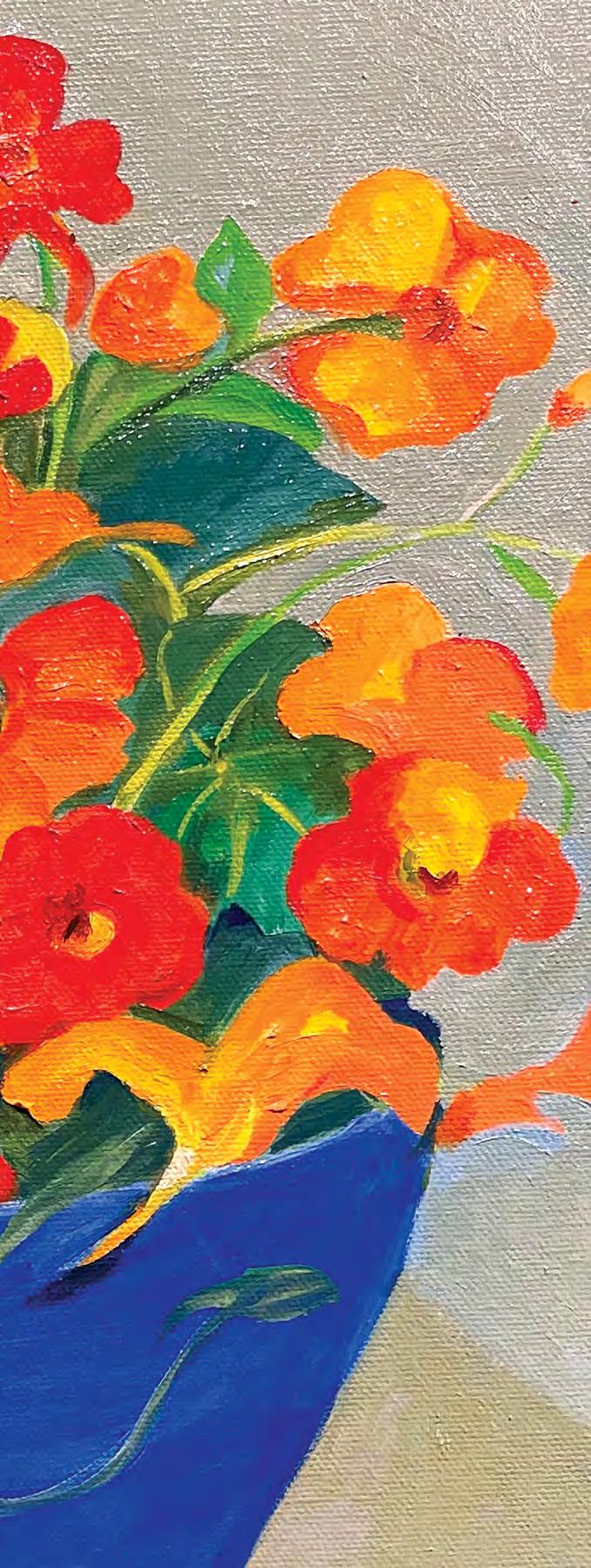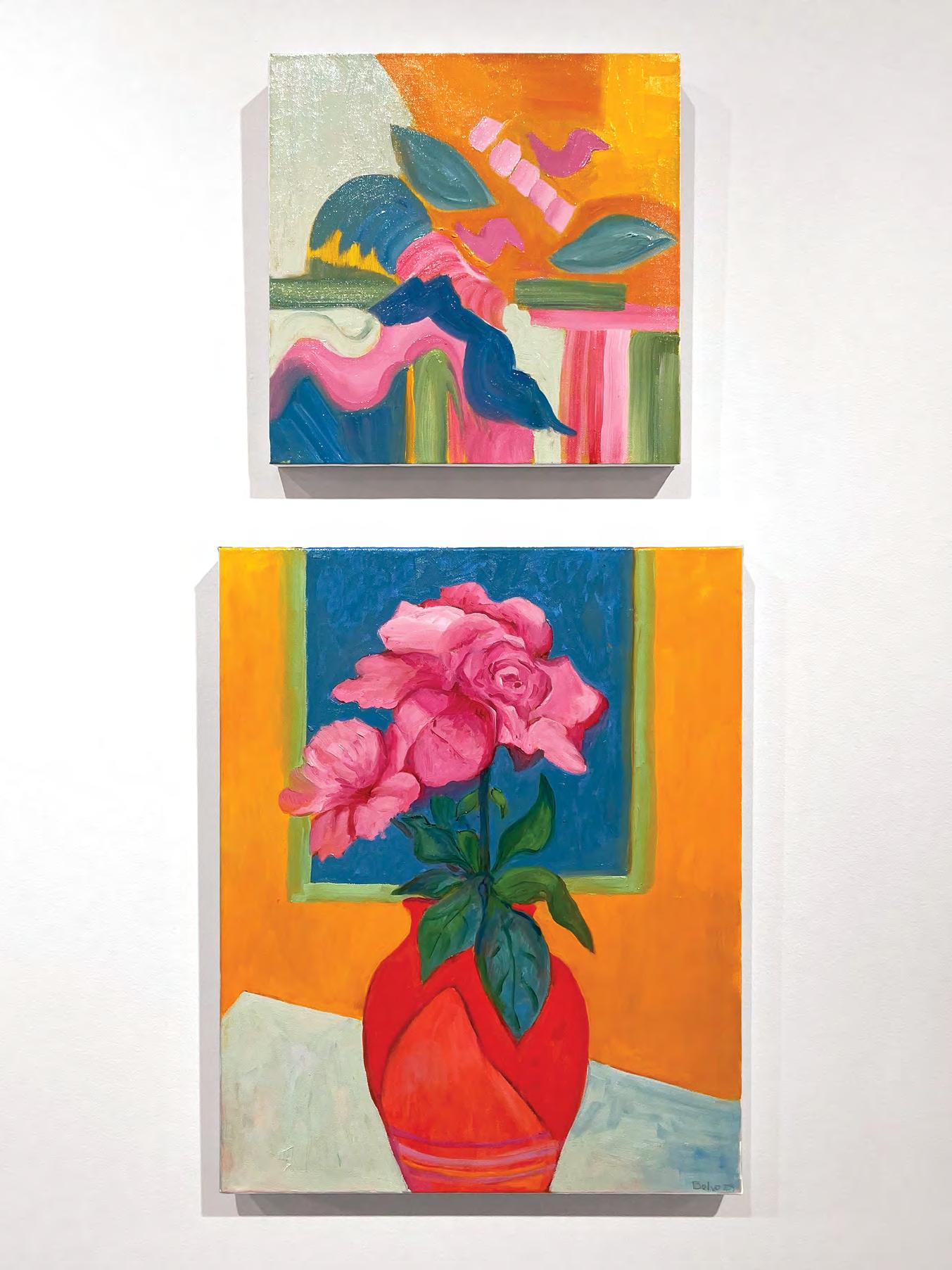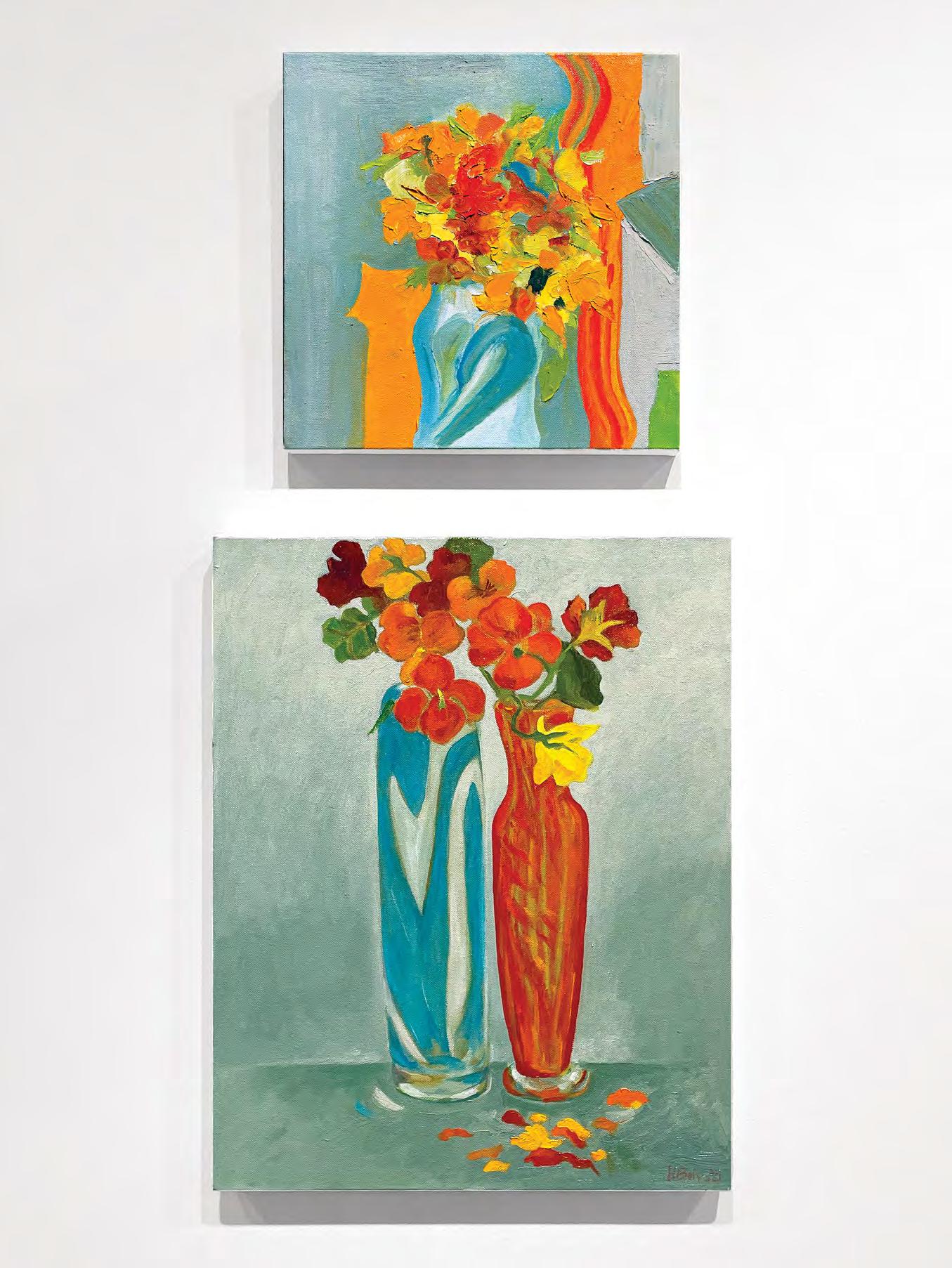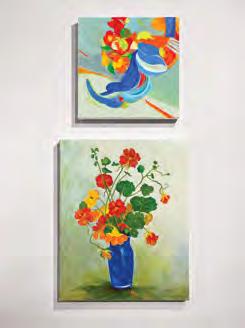

 Pink Roses: Red and Green
Peter Zelle Vase (DETAILS ON FRONT AND BACK COVERS)
Pink Roses: Red and Green
Peter Zelle Vase (DETAILS ON FRONT AND BACK COVERS)



 Pink Roses: Red and Green
Peter Zelle Vase (DETAILS ON FRONT AND BACK COVERS)
Pink Roses: Red and Green
Peter Zelle Vase (DETAILS ON FRONT AND BACK COVERS)
of Hazel Belvo and Marcia Casey Cushmore in their collaborative project, Juxtaposition The paintings seem to be reaching out to each other, communicating through color, gesture, and shape. The exhibition consists of rectangular still life paintings of floral arrangements by Belvo, paired with square abstract paintings by Cushmore. Employing different techniques and styles, the paintings work together as a pair, with points of connection and divergence that make the viewer’s eye jump from one painting to another.
The couple had never created work together before, despite working side by side in their open studio in Golden Valley for years. During Covid, Belvo felt inspired by works like Odilon Redon’s Still Life with Anemones (c. 1900 — 1910) that the Minneapolis Institute of Art owns. She began a process of experimenting with observation, painting the same thing many times in order to watch her work evolve.
Sixty years ago, Belvo trained as a classical portrait painter, but had never painted still life except one or two as a student. She decided to draw on her collection of hand blown glass vases for the project, using 16 x 20 inch canvases, the standard size and shape that students studying portraiture choose.
Cushmore felt compelled to create her own work inspired from Belvo’s floral portraits. Rather than working off the still life, Cushmore’s work drew on Belvo’s paintings as a launching pad for transformation. (In more recent iterations of the project, Belvo has also painted from Cushmore’s paintings). Both artists use the same palette, with the exception that Cushmore could mix differently or have one different color. She started making surfaces a little thicker, and taking liberties with the vase and the bottom of the painting, which started to become very expressionistic. Her abstractions in a way are deconstructions of the more figurative work that I have done, Belvo said.
Belvo and Cushmore met in 1985 in Grand Marais, a small town where Belvo spent many years teaching at the Grand Marais Artist Colony. It’s near Grand Portage, where Belvo lived and had a studio with the late George Morrison, the Ojibwe landscape painter and sculptor with whom Belvo was married.
Outside of a gallery, Belvo noticed an enormous dog taking up the entire back of a car — the dog and the car were Cushmore’s. The two connected right away, but both were in the midst of full lives. Belvo was married to Morrison, and Cushmore was still in the midst of raising children. They moved in together eight years later.
Cushmore is a philosopher by training, worked as a filmmaker, studied at the Humphrey Institute of Public Affairs (later re-named the Humphrey School of Public Affairs) at the University of Minnesota doing leadership training, and worked as a consultant. After she met Belvo, she turned toward art, going back to school to study media arts and fine arts in her mid 40s.
Their Juxtaposition project reveals a shared language and intimacy. In one pair of paintings, Belvo’s portrayal of white amaryllis pop from the indigo background. Cushmore’s response flattens the bouquet. The petal shapes become separated, with one of the shapes elongating to look as if it’s dripping, almost as if it is pointing downward toward Belvo’s painting below it. In another pairing, the primary colors in the glass vase in Belvo’s painting appear as larger blocks, searching and playful, in Cushmore’s.
Belvo uses a glazing technique, applying layers of paint over an underpainting, resulting in a rich luminous texture. Her paintings don’t have a lot of extraneous details — the bouquet shines through as the star. The details lie in the specificity of colors and brush strokes she uses to bring the flowers to life. Cushmore uses an impasto technique, using a palette knife to apply the paint onto the canvas. They are full of force and energy.
Where Belvo’s paintings create an expression of emotion from careful study of her subject, Cushmore’s responses improvise with spontaneity and dramatic gesture. Together, the paintings create a flow of conversation that relishes the joy of celebrating the push and pull of togetherness and difference.
Written by Sheila Regan, March 2023 Sheila Regan is a Twin Cities-based arts freelance journalist, columnist and critic. She writes MinnPost’s twice-weekly Artscape column, the Star Tribune, Pioneer Press and elsewhere.

 Still Life with Two Orange Dots: After Pearl Fine
Still Life with Two Orange Dots: After Pearl Fine


Cadmium Red Roses: Transparent Glass Vase


 Pale Blue
Vase from Tom Patnode
Pale Blue
Vase from Tom Patnode

 Dioxazine Purple Iris: Transparent Vase
Pale Blue Vase from Tom Patnode
Dioxazine Purple Iris: Transparent Vase
Pale Blue Vase from Tom Patnode

 Rainbow Vase: Peter Zelle Vase
White Lilies: Rose Sky, Dale Chihuly Cylinder
Rainbow Vase: Peter Zelle Vase
White Lilies: Rose Sky, Dale Chihuly Cylinder


 Nasturtium: Cobalt Blue Peter Zelle Glass Bowl
Nasturtium: Cobalt Blue Peter Zelle Glass Bowl


The End: Transition to Normal: Red Vase



 Yellow Tulips in Hand Blown Glass Vase
Yellow Tulips in Hand Blown Glass Vase


 Nasturtium: Cobalt Blue Peter Zelle Vase
Nasturtium: Cobalt Blue Peter Zelle Vase


 Red Amaryllis in Peter Zelle Vase
Red Amaryllis in Peter Zelle Vase



 Nasturtium: Orange and Red Peter Zelle Vases
Nasturtium: Orange and Red Peter Zelle Vases
Nasturtium: Orange and Red
Peter Zelle Vases

 Rose Madder
Pink Roses: Rainbow Peter Zelle Vase
Rose Madder
Pink Roses: Rainbow Peter Zelle Vase

 Rose Madder Pink Roses: Rainbow Peter Zelle Vase
Rose Madder Pink Roses: Rainbow Peter Zelle Vase


 Yellow Roses: Carol’s Antique Vase
Yellow Roses: Carol’s Antique Vase
 Pink Lilies: Transparent Glass Vase
Pink Lilies: Transparent Glass Vase
 White Lilies: Raw Sienna Vase
White Lilies: Raw Sienna Vase


 Nasturtium: Red Vase
Nasturtium: Red Vase


 White Amaryllis and Indigo Sky
White Amaryllis and Indigo Sky


 Redon’s Flowers
in Peter Zelle Vase
Redon’s Flowers
in Peter Zelle Vase
 Bouquet in Dale Chihuly Cylinder
Bouquet in Dale Chihuly Cylinder
























1 R ed Amaryllis in Peter Zelle Vase, 2020 – 2023
D iptych, Oil on Canvas, 12 x 12 in and 20 x 16 in
2 R edon’s Flowers in Peter Zelle Vase, 2020 – 2023
D iptych, Oil on Canvas, 12 x 12 in and 20 x 16 in
3 B ouquet in Dale Chihuly Cylinder, 2020 – 2023
D iptych, Oil on Canvas, 12 x 12 in and 20 x 16 in
4 W hite Amaryllis and Indigo Sky, 2020 – 2023
D iptych, Oil on Canvas, 12 x 12 in and 20 x 16 in
5 C alla Lilies in Peter Zelle Vase, 2020 – 2023
D iptych, Oil on Canvas, 12 x 12 in and 20 x 16 in
6 Yellow Tulips in Hand Blown Glass Vase, 2020 – 2023
D iptych, Oil on Canvas, 12 x 12 in and 20 x 16 in
7 R ainbow Vase: Peter Zelle Vase, 2020 – 2023
D iptych, Oil on Canvas, 12 x 12 in and 20 x 16 in
8 P ale Blue Vase from Tom Patnode, 2020 – 2023
D iptych, Oil on Canvas, 12 x 12 in and 20 x 16 in
9 U S. Two Peter Zelle Vases, 2020 – 2023
Triptych, Oil on Canvas, 12 x 12 in, 20 x 16 in, 12 x 12 in
10 N asturtium: Red Vase, 2020 – 2023
D iptych, Oil on Canvas, 12 x 12 in and 20 x 16 in
11 N asturtium: Orange and Red Peter Zelle Vases, 2020 – 2023
D iptych, Oil on Canvas, 12 x 12 in and 20 x 16 in
12 N asturtium: Cobalt Blue Peter Zelle Vase, 2020 – 2023
D iptych, Oil on Canvas, 12 x 12 in and 20 x 16 in
13 W hite Lilies: Raw Sienna Vase, 2020 – 2023
D iptych, Oil on Canvas, 12 x 12 in and 20 x 16 in
14 W hite Lilies: Rose Sky, Dale Chihuly Cylinder, 2020 – 2023
D iptych, Oil on Canvas, 12 x 12 in and 20 x 16 in
15 P ink Lilies: Transparent Glass Vase, 2020 – 2023
D iptych, Oil on Canvas, 12 x 12 in and 20 x 16 in
16 Yellow Roses: Carol’s Antique Vase, 2020 – 2023
D iptych, Oil on Canvas, 12 x 12 in and 20 x 16 in
17 C admium Red Roses: Transparent Glass Vase, 2020 – 2023
D iptych, Oil on Canvas, 12 x 12 in and 20 x 16 in
18 R ose Madder Pink Roses: Rainbow Peter Zelle Vase, 2020 – 2023
D iptych, Oil on Canvas, 12 x 12 in and 20 x 16 in
19 D ioxazine Purple Iris: Transparent Vase, 2020 – 2023
D iptych, Oil on Canvas, 12 x 12 in and 20 x 16 in
20 P ink Roses: Red and Green Peter Zelle Vase, 2020 – 2023
D iptych, Oil on Canvas, 12 x 12 in and 20 x 16 in
21 S till Life with Two Orange Dots: After Pearl Fine, 2020 – 2023
D iptych, Oil on Canvas, 12 x 12 in and 20 x 16 in
22 N asturtium: Cobalt Blue Peter Zelle Glass Bowl, 2020 – 2023
D iptych, Oil on Canvas, 12 x 12 in and 20 x 16 in
23 T he End: Transition to Normal: Red Vase, 2020 – 2023
D iptych, Oil on Canvas, 12 x 12 in and 20 x 16 in
Hazel Belvo has been an exhibiting painter for sixty years and has works in many private and public and museum collections including The Steinway Collection, New York, The Bezelel Museum in Israel, the Minneapolis Institute of Art, Weisman Museum and MMAA. Her first museum exhibition was in 1960. She grew up in southern Ohio where she was never not drawing. After art school she moved to New York City, went to the New School for Social Research and then was a fellow at the Bunting Institute at Harvard for two years. Her Bachelors and masters degrees are from the University of Minnesota and she was a WARM Gallery member from 1976 to 1986. She taught at Quaker Schools and Rhode Island School of Design in Rhode Island, had a studio in Provincetown Massachusetts. She was teacher and chair of fine arts at St Paul Academy and Summit School where she designed and developed the Fine Arts Program. In 1989 she became the Professor and Chair of the Division of Fine Art at Minneapolis College of Art and Design where she is now a Professor Emerita. She shares her life and studios in Minneapolis and in Grand Marais with artist and philosopher, Marcia Casey Cushmore and teaches mentored classes at the Grand Marais Art Colony.
She is known for her fifty year exploration of a single tree, the Spirit Tree, on the Grand Portage Ojibway Reservation, Lake Superior. Her current body of work Spirit Tree: Honey Locust is a series of 18 large scale paintings, a rorest, inspired by Overstory, a book by Richard Powers and is a tribute to a Honey Locust tree that was behind the Metropolitan Museum in New York City and cut down to build an extension to the museum. Recently a monograph of her life and work was written by Julie l’Enfant and published by Afton Press titled Hazel Belvo: A Matriarch of Art.

Hazel Belvo has had a long career as a painter and experimenter, having been one of the founders of the feminist art collective, Women’s Art Registry of Minnesota (WARM) in the mid-1970s. Her experimentation continues in this pair of oil paintings, one by her and one by her partner, Marcia Cushmore. Belvo started to create a series of floral still lives when confined to their home in 2020 during the COVID-19 pandemic. She turned to painting at a small scale, rather than her more typical large paintings with gestural brush strokes and expressionistic surfaces. Choosing a classic still life subject—a bouquet of flowers in a vase—Belvo found that working on a small canvas helped to focus her mind, taking her thoughts away from the news of the day. She and Cushmore decided to create a conversation between them, with Marcia, an abstract painter, responding to Hazel’s colors and subjects, translated to her style. Marcia deconstructs Belvo’s forms and colors, revealing a delightful, energetic re-interpretation of the original subject. They created more than a dozen pairs of paintings, that represent conversations between the artists and between representation and abstraction. The results have delighted many, as in this pair, which the artists intend should hang with Cushmore’s square canvas just slightly above and centered on Belvo’s (they recommend 2.5 inches between them).
Hazel Belvo taught at the Minneapolis College of Art and Design, where she also served as Dean for many years. Her artistic career has taken place across the U.S. and in Europe, having lived in Ohio, Provincetown, New York City, and Paris, before coming to Minnesota in the 1960s with her husband, George Morrison. Her life and career are extensively documented by art historian Julie L’Enfant in Hazel Belvo: Matriarch of Art . A retrospective exhibition of Belvo’s work is planned at the Minnesota Museum of American Art for 2024.
A philosopher and an artist, Marcia Cushmore is a graduate of the University of Kansas and also studied at the Minneapolis College of Art and Design, University of Edinburgh, Scotland; Kings College, University of Aberdeen, Scotland; and Parsons School of Design in Paris. She is a bravura colorist who sometimes works in pure abstraction and other times with abstracted landscapes, creating stirring compositions in either approach.
Both artists live in the Twin Cities and Grand Marais, Minnesota
Marcia Casey Cushmore
American, b. August 15, 1940, Hutchinson, Kansas
Marcia Casey Cushmore is a painter, photographer, sculptor, and printmaker who lives and works in Minneapolis and Grand Marais, MN. She has exhibited widely throughout the United States, Paris and Argentina.

Prior to devoting her life to her art, Marcia was a professor of philosophy, academic dean, Humphrey School Fellow, Director of Federal Relations for the University of Minnesota, award winning independent film producer and Leadership Consultant. She consulted with the People’s Republic of China in 1985 focusing on contemporary American culture and also worked with Vaclav Havel’s Cabinet in structuring the new government of Czechoslovakia after the “Velvet Revolution of 1989.”
Having worked and shown for the last 3 decades, her current focus is on abstraction based in nature. A colorist she places emphasis on texture, pattern, movement, and the richness and wisdom of nature.
Marcia has a rich life in art with her partner, the artist Hazel Belvo. They have traveled widely with their studio in a backpack painting and exploring the world.


Kansas University, B.A. with Honors, Philosophy
University of Edinburgh, Scotland, Graduate Certificate in Philosophy, Literature, History
University of Aberdeen, King’s College, Honors M.A.
University of Minnesota, Post M.A. work in Philosophy, Public Policy, Literature
Minneapolis College of Art and Design, Four year Fine Arts Post Grad Parsons School of Design, Paris Program LIFE!

